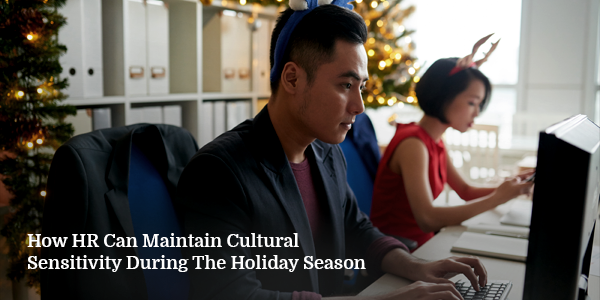
The Holiday season is fast approaching, and employees are surely excited about many things: lighter workloads, physical or virtual Christmas parties, and well-deserved bonuses. However, people of diverse backgrounds celebrate the holidays differently. With all the diversity and inclusion efforts in the past years, global workplaces must practice cultural sensitivity, even on holidays.
Religion is a part of someone’s identity, and recognizing this difference in your workplace equates to respecting various individuals. Your employees must feel seen and accepted even if the “norm” is to celebrate only the majority’s holiday traditions and customs.
How do companies with offshore staff practice holiday cultural sensitivity? Read on to learn more.
7 Ways to Maintain Holiday Cultural Sensitivity at Work
Holidays can be fun AND culturally sensitive. Here are seven ways to make a celebration that surpasses various cultural practices.
1. Start with an employee census
Communication is key to promoting a culture of equality and diversity. It is best to enjoy a festive celebration when it is wanted. First things first: consult your employees. Hand out surveys asking them what they think about holiday celebrations at the office. You may also ask about which dates they prefer and their dietary preferences.
Remember, not everyone may abide by organized faith. An agnostic or atheist’s concern is as important as those who are religious. Allow the responses you collected to guide you further.
Most importantly, consult your employee records to check their religion. If even one employee is not Christian, it may not be the most inclusive and appropriate action to call an event a “Christmas party.” Instead, opt for a neutral term like “Holiday Party” or “Year-end Celebration.”
2. Create awareness of other religious traditions in your workplace
After you have secured the answers, you will need a little research. First, learn about the different holiday celebrations that your employees may celebrate, like Hanukkah, Kwanzaa, and others.
Once you have enough information, create thoughtful awareness in the office by posting infographics on bulletin boards, emailing, or even conducting a special webinar. It may be a small gesture, but this will make employees of distinct backgrounds feel seen and respected.
3. Recognize different holidays at work
Inclusivity must translate into your office practices. It is not enough that you conduct culture-neutral celebrations; you must also recognize the different holidays that come with them. Company-wide, no-work holidays for other religions must be observed.
For example, Kwanzaa, an African-American celebration, is typically celebrated from December 26 to January 21. Setsubun-sai, a celebration of the Shintos, falls on the first week of February. For Muslims, the holy month of Ramadan starts on different dates each year, so it is best to consult an Islamic calendar before making plans.
Adding these celebrations to the company calendar will mean a lot to your employees.
4. Consider cultural dietary restrictions
If dietary restrictions can be followed for medical purposes, then they can also be followed for cultural purposes. For example, ham is a popular food during Christmas, but it is not appropriate for Muslims, Jewish, and Hindus. Lechon, or roasted suckling pig, is a festive and indulgent food in the Philippines but is forbidden in other religions like Islam.
If the majority of the workplace’s population demands the presence of these foods, perhaps place them on another table and do not place them next to the other meals as they may incite offense.
5. Make holiday celebrations optional
The holiday season calls for friends and family gatherings that may matter more to some employees. Some religions do not celebrate the holidays like Jehovah’s Witnesses, while there may be employees who are simply uncomfortable attending due to personal reasons.
Make it clear to your employees that attending your office gathering is optional. The purpose of a party is to have fun and not coerce attendees into doing something they are not comfortable with, so it’s best to keep an open mind about that. Plus, an enjoyable party will inevitably follow when attendees are present due to pure eagerness.
6. Put up secular holiday decor
Holidays call for shiny and quirky decor, but ensure they are inclusive! The vibe of the office must feel inclusive to all employees. Secular holiday decorations are ornaments that do not provide religious imagery.
Your office may be just as festive with candy cane trinkets, snowmen, socks, tinsel, garland, or even a reindeer. You may encourage employees to participate in setting up these knickknacks too.
7. Offer floating time-offs
Floating time-offs or floating holidays is a paid holiday that employees may use any time of the year for significant yet working public celebrations.
In case of unannounced holidays, a floating time off can be beneficial to keep your operations running while also allowing your employees to celebrate their special holidays. It promotes a productive yet inclusive workplace culture—and everybody wins.
The Holiday Spirit is for Everyone Who Celebrates It
Holidays are a great way to relax and just celebrate the end of a productive year, but no employee must feel left out. Every employee worked hard for the company’s success, and it is only proper not to leave out anyone in the holiday spirit, no matter their religious background, ethnic traditions, or belief.
Due to the growing diversity in workplaces, the need for cultural sensitivity heightens. Inclusive practices must be observed during the holiday season, even if the norm is to celebrate just one religious occasion. A happy holiday in the office is a holiday with happy employees.
Wishing you a joyous celebration!
For those wanting to diversify their talent pool, Manila Recruitment can help you find and manage remote and offshore workers from the Philippines. Contact us today.













